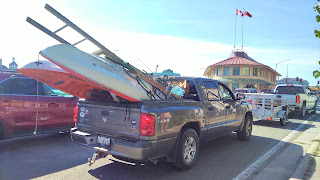A Christmas card came from Heidrun, a friend from Münster, Germany, hoping that our family had managed to cheat Covid during 2021. She used an idiom I didn't know before: "Hoffentlich habt ihr alle Covid ein Schnippchen geschlagen."
Although Chris and I seem to be avoiding it still, all four of Emma's (our daughter's) family have succumbed, presumably to the Omicron variant that has suddenly spread everywhere, at this end of the year. All but Tom were protected by vaccinations, and Tom is young and fit, so it hasn't hit them too hard. However, they have had to stay indoors, at home, right through the Christmas week. The Australian contingent of our family is fine, enjoying their summer holidays; George took Eddy and one of Eddy's friends and his dad bush-hiking on New Year's Eve, doing "the Piles Creek Loop", a giant iguana crossing their path at one point. "Some proper hiking!" George called this outing.
This week I have been cheating at my blog-writing, trying to catch up with all the posts I hadn't written during the last four months of the year. They appear in backwards chronological order, but only because I have amended their dates of publication. Before anything else happens worth recording, I still have some catching up to do.
We just watched the latest BBC video of fireworks round the world, which is also cheating time, because, where we are, we have not yet reached the turn of the year. Sydney certainly won the unofficial contest so far, for the most commanding display! In our part of the world it's Covid numbers that are shooting up once more, not fireworks — in Quebec there's even a curfew in effect from 11 p.m. to 5 a.m. which puts paid to any celebrations on that side of the river, and Ottawa hardly seems in the mood for rejoicing either, reporting 1508 cases of Covid today, which is a record number. So, because we are not sharing this evening with anyone else, neither shall we be staying up to discover what is going to happen at midnight in Ottawa or New York.
As Heidrun says about the new year: "Möge es wieder entspannende Begegnungen mit Menschen in der Nähe ermöglichen. Ich bin guter Hoffnung." Translation: May it once again bring relaxed encounters with people at close quarters. I have high hopes.
So have I. A Happy New Year to anyone reading this.





















































